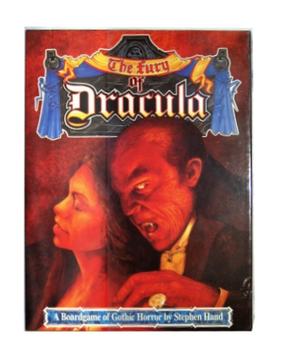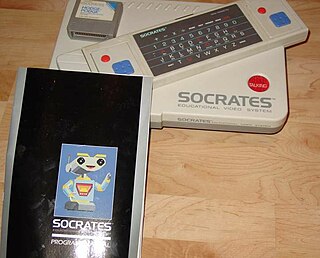Related Research Articles

Tic-tac-toe, noughts and crosses, or Xs and Os is a paper-and-pencil game for two players who take turns marking the spaces in a three-by-three grid with X or O. The player who succeeds in placing three of their marks in a horizontal, vertical, or diagonal row is the winner. It is a solved game, with a forced draw assuming best play from both players.

Euchre or eucre is a trick-taking card game commonly played in Australia, Canada, Great Britain, New Zealand, and the Midwestern United States. It is played with a deck of 24, 25, 28, or 32 standard playing cards. There are normally four players, two on each team, although there are variations for two to nine players.

Simon Says is a children's game for three or more players. One player takes the role of "Simon" and issues instructions to the other players, which should be followed only when succeeding the phrase "Simon says". Players are eliminated from the game by either following instructions that are not immediately preceded by the phrase, or by failing to follow an instruction which does include the phrase "Simon says". It is the ability to distinguish between genuine and fake commands, rather than physical ability, that usually matters in the game; in most cases, the action just needs to be attempted.

Concentration is a round game in which all of the cards are laid face down on a surface and two cards are flipped face up over each turn. The object of the game is to turn over pairs of matching cards.

Mafia, also known as Werewolf, is a Russian social deduction game created by Dimitry Davidoff in 1986. The game models a conflict between two groups: an informed minority and an uninformed majority. At the start of the game, each player is secretly assigned a role affiliated with one of these teams. The game has two alternating phases: first, a night-phase, during which those with night-killing-powers may covertly kill other players, and second, a day-phase, in which all surviving players debate and vote to eliminate a suspect. The game continues until a faction achieves its win-condition; for the village, this usually means eliminating the evil minority, while for the minority, this usually means reaching numerical parity with the village and eliminating any rival evil groups.

Telephone, or Chinese whispers, is an internationally popular children's game in which messages are whispered from person to person and then the original and final messages are compared. This sequential modification of information is called transmission chaining in the context of cultural evolution research, and is primarily used to identify the type of information that is more easily passed on from one person to another.

Combinatorial game theory is a branch of mathematics and theoretical computer science that typically studies sequential games with perfect information. Study has been largely confined to two-player games that have a position that the players take turns changing in defined ways or moves to achieve a defined winning condition. Combinatorial game theory has not traditionally studied games of chance or those that use imperfect or incomplete information, favoring games that offer perfect information in which the state of the game and the set of available moves is always known by both players. However, as mathematical techniques advance, the types of game that can be mathematically analyzed expands, thus the boundaries of the field are ever changing. Scholars will generally define what they mean by a "game" at the beginning of a paper, and these definitions often vary as they are specific to the game being analyzed and are not meant to represent the entire scope of the field.

Tag is a playground game involving one or more players chasing other players in an attempt to "tag" and mark them out of play, typically by touching with a hand. There are many variations; most forms have no teams, scores, or equipment. Usually when a person is tagged, the tagger says, "It!" or "Tag, you're 'It'!" The last one tagged during tag is "It" for the next round. The game is known by other names in various parts of the world, including "running and catching" in India and "catch and cook" in the Middle East.
A coordination game is a type of simultaneous game found in game theory. It describes the situation where a player will earn a higher payoff when they select the same course of action as another player. The game is not one of pure conflict, which results in multiple pure strategy Nash equilibria in which players choose matching strategies. Figure 1 shows a 2-player example.

Jungle or dou shou qi is a modern Chinese board game with an obscure history. A British version known as "Jungle King" was sold in the 1960s by the John Waddington company. The game is played on a 7×9 board and is popular with children in the Far East.
Royal Cotillion is a solitaire card game which uses two decks of 52 playing cards each. The name probably derives from the fact that since the two kings and two queens of the same suit, the king and queen of each suit dance the cotillion. It has been given the alternate name of Lords and Ladies because if the game is won, the final layout will show the king and queen of each suit together.

Chu shogi is a strategy board game native to Japan. It is similar to modern shogi in its rules and gameplay. Its name means "mid-sized shogi", from a time when there were three sizes of shogi variants that were regularly being played. Chu shogi seems to have been developed in the early 14th century as a derivative of dai shogi. There are earlier references, but it is not clear that they refer to the game as we now know it.

Cabela's Dangerous Hunts 2 is a 2005 hunting video game published Activision for PlayStation 2, Xbox, GameCube, and Microsoft Windows. It is a sequel to the 2003 game Cabela's Dangerous Hunts.

Night Warriors: Darkstalkers' Revenge, known in Japan as Vampire Hunter: Darkstalkers' Revenge, is the second game in the Darkstalkers fighting game series, developed and released by Capcom for the arcades in 1995. Darkstalkers' Revenge was ported to the Sega Saturn home console in 1996, and included in the compilation releases Vampire: Darkstalkers Collection in 2005, Darkstalkers Resurrection in 2013, and Capcom Fighting Collection compilation in 2022.

The Fury of Dracula is a board game for 2-4 players designed by Stephen Hand and published by Games Workshop in 1987. Fantasy Flight Games released an updated version in 2006 as Fury of Dracula, and a third edition in 2015 by the same name. WizKids Games released a fourth edition in 2019.
Traditional Filipino games or indigenous games in the Philippines are games that are played across multiple generations, usually using native materials or instruments. In the Philippines, due to limited resources for toys, children usually invent games that do not require anything but players. There are different kinds of Filipino traditional games which are well-suited for kids, and the games also stand as one of the different cultural and traditional games of the Philippines. Due to the variety of skills used in these games, they serve an important purpose in the physical and mental development of Filipino children. These games are also an important part of Filipino culture.

An educational video game is a video game that provides learning or training value to the player. Edutainment describes an intentional merger of video games and educational software into a single product. In the narrower sense used here, the term describes educational software which is primarily about entertainment, but tends to educate as well and sells itself partly under the educational umbrella. Normally software of this kind is not structured towards school curricula and does not involve educational advisors.
Smear is a North-American trick-taking card game of the all fours group, and a variant of pitch (setback). Several slightly different versions are played in Michigan, Minnesota, Northern and Central Iowa, Wisconsin and also in Ontario, Canada.

A game is a structured type of play, usually undertaken for entertainment or fun, and sometimes used as an educational tool. Many games are also considered to be work or art.

Monster Hunter: World is a 2018 action role-playing game developed and published by Capcom. The fifth mainline installment in the Monster Hunter series, it was released worldwide for PlayStation 4 and Xbox One in January 2018, with a Windows version following in August 2018. In the game, the player takes the role of a Hunter, tasked to hunt down and either kill or trap monsters that roam in one of several environmental spaces. If successful, the player is rewarded through loot consisting of parts from the monster and other elements that are used to craft weapons and armor, amongst other equipment. The game's core loop has the player crafting appropriate gear to be able to hunt down more difficult monsters, which in turn provide parts that lead to more powerful gear. Players may hunt alone or in a group of up to four players via the game's online multiplayer.
References
- ↑ "Sleeping Lions - How to play". Kidspot.com.au. Retrieved 3 November 2016.
- ↑ Quick, P.S. (2014). 100 Party Games for Children. Andrews UK. ISBN 9781785380945 . Retrieved 3 February 2020.
- ↑ Hand, Richard J. (2019). Performing Grand-Guignol: Playing the Theatre of Horror. University of Exeter Press. p. 15. ISBN 9780859891134.